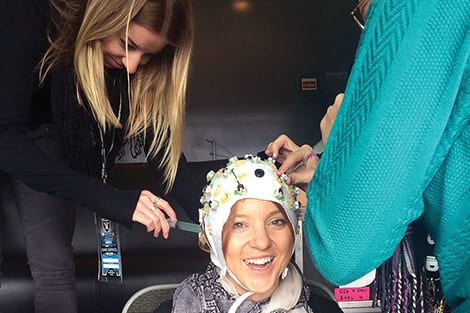Haas researchers advance the new field of neuromarketing

When fans packed the Oakland Coliseum Dec. 6 to watch the Raiders play the Kansas City Chiefs, eight had a unique experience. These volunteers—some Berkeley Haas alumni—donned white skullcaps sprouting small electrodes that monitored their brain activity as they watched the football game.
The EEG tests were a field trial of sorts that is pushing the boundaries of a new field of neuromarketing, pioneered by Berkeley Haas Asst. Prof. Ming Hsu and Prof. Leif Nelson. The pair aim to understand how consumers think and feel about companies and their product offerings using neuroscience. This study originated when they were contacted by Brandon Doll, MBA 14, the director of strategic projects for the Oakland Raiders.
Doll’s job involves figuring out how to keep existing ticket holders happy and convert novices into loyal fans. Of the volunteers, four were diehard Raiders fans and the others had either never been to an NFL game or not attended one in at least five years.
“We wanted to…see if we could get casual fans’ brain activity to move closer to that of the loyal fans during the game,” Doll explains.
Hsu says that sporting events demonstrate how experiences shape our preferences and behavior. “We see from our data that for casual fans, attendance resulted in long-lasting positive memories—not only of the event but also of the Raiders’ brand,” Hsu says.
Says Doll, “This could one day allow us to reverse- engineer customer loyalty.”